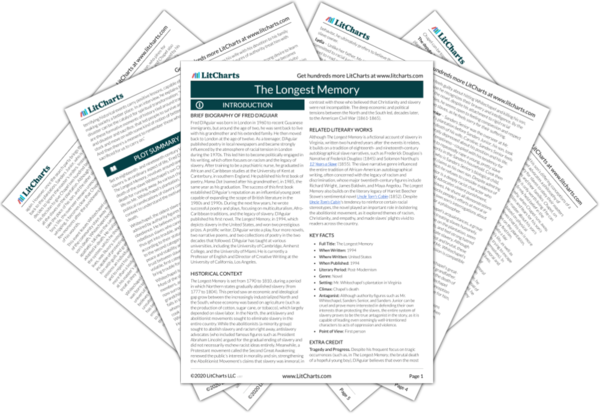In The Longest Memory, the notion of paradise represents the deep divisions that exist between the old slave Whitechapel’s views about death and other slaves’ hope in freedom. While many slaves—including Whitechapel’s son, Chapel—yearn to be free and believe that they might reach paradise on earth by running away, Whitechapel crushes their hopes by claiming that the only paradise that exists is the one that people go to after death (heaven). In this way, Whitechapel suggests that freedom is merely an illusion, an attractive dream that will never come to fruition. His pessimism leads him to reject rebellion and to embrace obedience until it is too late—that is, until his very own son dies, reaching the “premature paradise” Whitechapel wanted to save Chapel from. Paradoxically, through trying to keep his son from believing in fantasies of liberty, Whitechapel discovers that his own trust in obedience is also a fantasy, as it fails to protect his family. The concept of paradise thus highlights Whitechapel’s shift from his focus on physical preservation to his understanding that idealism and optimism are also important in life, as they are potentially capable of maintaining slaves’ humanity, sense of agency, and hope in the future.
Paradise Quotes in The Longest Memory
There are two types of slave: the slave who must experience everything for himself before coming to an understanding of anything and he who learns through observation. The slave in the first category behaves as if he is the only slave in the world and is visited by the worst luck on earth. That type of slave is agitated, brings much trouble on his head and he makes the lot of every slave ten times worse. It is generally accepted that the slave in the second category is brighter, lives longer, causes everyone around him a minimum of worries and earns the small kindness of the overseer and the master.
Protector of the worst fate of your people or any people. Is that what I have become? The master of my fate. No longer in need of control or supervision. One so accustomed to his existence that he impinges on his own freedom and can be left to his own devices. A master of his own slavery. Slave and enslaver. Model slave. Self-governing slave. Thinks freedom is death. Thinks paradise is the afterlife.
He never talked about Africa. It was his view, I found out later, that such talk promoted day dreams and insolence on the plantation. He said Africa was his past and not ours. If anyone had the right to dream about it, he did and he chose not to, so why should anyone else.












